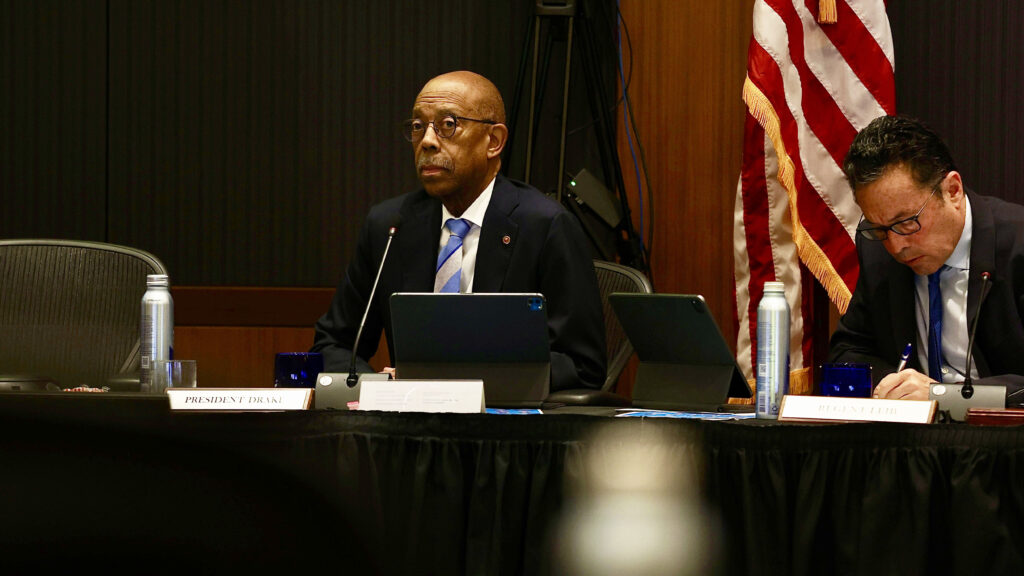UC President Michael Drake listens to public speakers at the March 20, 2024 UC Regents meeting at the UCLA campus.
Credit: Julie Leopo / EdSource
University of California President Michael V. Drake will step down at the end of the upcoming academic year, closing out a five-year tenure in which he navigated the 10-campus system through the Covid-19 pandemic, enrollment growth, labor strife and campus protests.
Drake, 74, announced his plan in a letter Wednesday to the UC community.
“I am immensely proud of what our students, faculty, and staff have accomplished these past several years. You have weathered a global pandemic and historic natural disasters, dealt with international conflict and domestic political uncertainty, navigated the stresses and opportunities of daily life, all while making our University stronger, more resilient, more impactful, and more inclusive than ever before,” he said.
Drake, who was UC’s first Black president, took over as president in August 2020 after previously serving as the president of the Ohio State University. He also previously was the chancellor of UC Irvine and UC’s systemwide vice president of health affairs.
Drake became UC’s president as campuses were preparing to enter their first full academic year during the Covid-19 pandemic. He helped guide the system through remote instruction and welcoming students back to campuses.
Gov. Gavin Newsom in a statement Wednesday praised Drake’s handling of the pandemic, saying in a statement Wednesday that he “took the reins of the University of California during the height of the pandemic and has led with grace and vision in the years since.”
Newsom worked directly with Drake to develop a five-year compact that Newsom’s office and UC agreed to in 2022. As part of the compact, Newsom pledged annual funding increases of 5% for UC in exchange for the system working toward a number of goals, including improving graduation rates and increasing enrollment of California residents.
Getting more Californians enrolled has also been a priority of state lawmakers, who have frequently called on UC to do so. And recently, UC has started to make progress in that area. In fall 2023, the system’s freshman class had 42,058 Californians — 2,094 more than the previous fall, the largest year-over-year increase during Drake’s tenure.
Further enrollment growth of California residents could be coming this fall. UC announced Wednesday that it admitted 93,290 California first-year students for fall 2025, a record number and a 4.3% increase from last year.
Drake’s tenure leading UC, however, hasn’t been without challenges.
In 2022, 48,000 UC academic workers walked off the job in what was the largest-ever strike of higher education employees. UC eventually reached an agreement with the workers that increased their pay and gave them improved benefits.
The union, however, authorized another strike this past spring amid pro-Palestinian protests, arguing that UC had violated workers’ rights by retaliating against them for participating in those protests. Workers ultimately went on strike at six campuses, though a judge later ordered them to halt their strike.
The pro-Palestinain protests and encampments consumed several of UC’s campuses this past spring, with several UC chancellors calling in police to arrest students and disband encampments. Protesters demanded that UC divest from companies linked to Israel, but Drake’s office said in April that it “has consistently opposed calls for boycott against and divestment from Israel.” It’s not clear to what degree protests will resume when the fall term begins.
As he enters his final year on the job, Drake plans to “continue the work that we have focused on during my tenure,” he said in his letter to the UC community.
“That includes expanding student support and creating paths to a debt-free UC education, ensuring that more California students can reap the benefits of a UC degree, building on the University’s academic and research excellence, and working to promote a safe and respectful community that fosters a free exchange of ideas,” he added.
Janet Reilly, the chair of UC’s board of regents, plans to soon appoint a committee that will begin a national search for the system’s next president.

